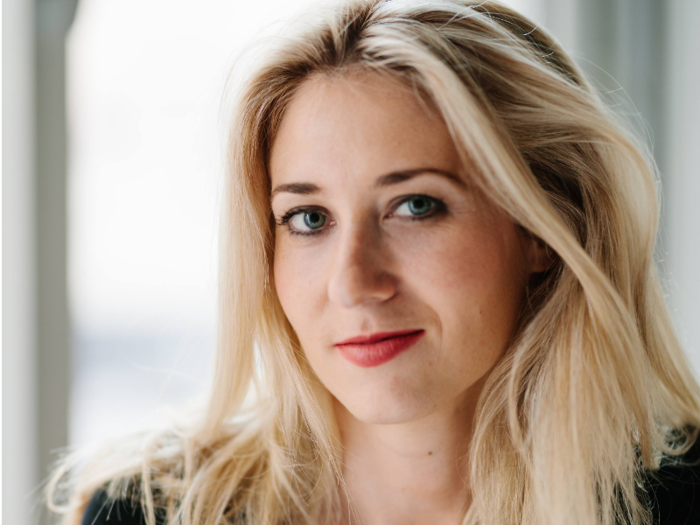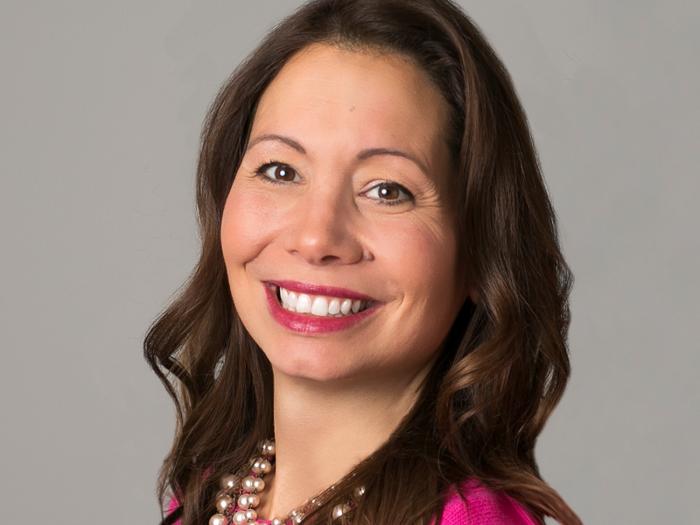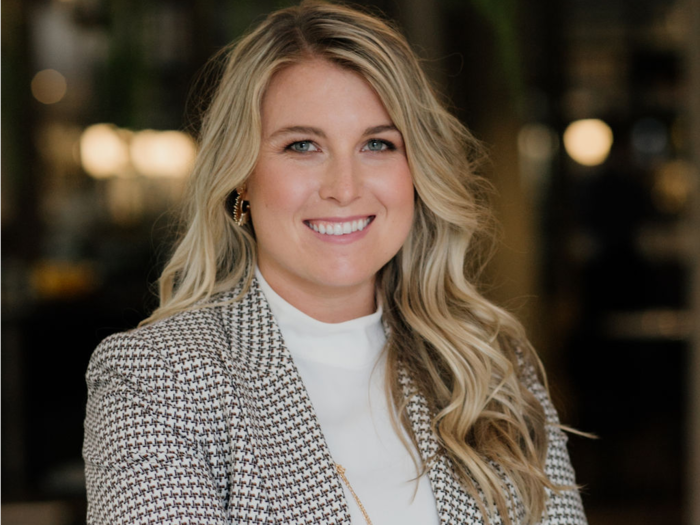- Home
- slideshows
- miscellaneous
- 'Everyone thought I had a dream job. Here's what they didn't know.'
'Everyone thought I had a dream job. Here's what they didn't know.'
“I had an ulcer from the stress.”

“The travel was draining me.”

Then: Sales for a travel company
Now: CEO and Founder, Brielle Friedman Creative
Brielle Friedman has always been passionate about visiting new places. So when she landed a job doing sales for a travel company, she was thrilled. "The company paid for transportation and accommodation, so it seemed like I was getting paid to travel to some pretty awesome places," she remembers.
The reality? "I never stayed in one place long enough to explore, and I was living in budget hotels, trying to use the Wi-Fi at random fast food restaurants to send follow-up emails in between long drives from one location to the next," she explains. Worse, she didn't feel fulfilled by the actual work, which made her feel depressed and lethargic.
Luckily, she was able to shift roles within her company, bringing her back to a schedule and work responsibilities that were more aligned with her lifestyle. "Flash forward a few years: I was directing all marketing initiatives, managing an eight-person team, and had developed and implemented a marketing strategy that helped the company grow from $10m to $36m in annual revenue," she explains. Plus, she then had the time and energy to travel for fun, and to pursue her other passion, salsa dancing!
Her advice: "Traveling for work sounds like a great perk, but in reality, it can be hard to create strong personal relationships when you're moving around so much. If you value deep friendships and take time to make new connections, a travel-heavy role may not be the best fit."
“The entire industry was collapsing.”

Then: Associate publisher of a major media brand
Now: Co-Founder and Coach, The Resting Mind
Jackie Ghedine had a high-powered job at "the holy grail of business to business publishing," she explains. And not only did the gig look great on paper, she loved it: She had inspiring co-workers, she was constantly learning from the media executives she worked with, and she was thrilled by the opportunity to run and build a brand.
The problem? "The media industry was collapsing on itself," she explains. "We had to find new ways to bring in revenue, so we were continuously creating new business units and opportunities to capture ad dollars." While some organizations have been able to find their footing, Jackie explains, her company wasn't making the investments in technology necessary for keeping up in the digital age.
"I felt like I was pushing a tremendous boulder uphill, and I knew I couldn't get to the top no matter how hard I worked," she explains. "At first it just meant longer hours, more in-market meetings, and being always-on at home — and then I realized it was destroying me." Ultimately, she realized that if the company couldn't pivot, she needed to, and she ultimately left the job.
Her advice: In larger organizations, there can be a tremendous disconnect between those on the street and their understanding of the needs in the marketplace and executive buy-in and vision. When these two ideas are not in alignment, it is almost impossible to shift corporate perspectives and by trying to do so, you can burn out and get disenchanted or unhappy.
“I was paid less than my male colleagues.”

Then: Columnist at a major tech magazine
Now: Professional Speaker and Author of Her Big Idea
When Haley Hoffman Smith was only 20 years old, she scored her own column at a big tech and entrepreneurship magazine. It was not only her dream job — she was great at it, and the column was quickly started getting both her and the publication a lot of attention.
But she wasn't being recognized for her efforts — not by a long shot. "Even though my work was bringing unprecedented attention to the company, and my article views were lapping the Editor in Chief's article views, I was blatantly informed that I was paid less than my male counterparts." The company kept pushing off her requests for a raise, so she eventually quit.
Her advice: "Never sacrifice your worth just because a job looks great to others. I'm proud of the work I did, and I'm proud of the hard decision I made to leave. It caused me great pain at the time, but the self-respect I earned is invaluable."
“My business model wasn’t working.”

Then and Now: CEO and co-founder, Impact Chain Lab
Aishwarya Balaji launched her blockchain innovation lab focused on global development long before the current crypto hype. So when blockchain became mainstream, people thought she had the most amazing job.
And in some ways, she did: "I was traveling all around the world, meeting fascinating people, speaking at conferences (I even gave a TEDx), and innovating with the most cutting edge technology to solve the world's biggest problems," she recalls.
But working a still-emerging field brings with it all kinds of ambiguity — a tough environment for a new business. "I was working in an industry with a tremendous amount of uncertainty with a lot of people who didn't have the public's best interests at heart, but rather wanted to make a quick buck," she explains. "The ambiguity surrounding the technology caused the ecosystem to be extremely volatile, which made it harder to build a company in the more traditional way."
Ultimately, the company decided to pivot away from its original model — consulting and incubating — and instead focus on tackling one specific problem, using emerging technology and data to reduce subjectivity and make wellness navigation easy through their platform, Bystander. It was the right move for the company and for Aishwarya: "I've never been happier," she adds.
Her advice: "It is really easy to get caught up in doing things just to maintain public perception, but eventually that starts to weigh on you. If you left a stable career to follow your passion and you later find out that your passion has evolved, it's more than okay to shift directions."
“I struggled with addiction.”

Then: Ad sales at a major tech company
Now: Founder, Brooke Taylor Coaching & Consulting
Brooke Taylor's job was working with big advertising agencies to find brand success on social platforms. And in some ways, she loved working for such a respected company. "Part of my identity was tied up with being an employee there,'" she says. "I secretly enjoyed the positive assumptions people made in their head when I told them I worked there."
But having her identity tied to work had its downsides, too. "Like many ambitious women, I had a belief that my success was equal to my worthiness," she says. "This created a manic, insatiable ambition to succeed at all costs, which manifested in workaholism, drinking alcohol to cope with the unworthiness, and not reporting a harassment." Brooke says she struggled in silence. "Working seven days a week is accepted and even applauded, and alcoholism is stigmatized and never spoken about in corporate settings."
She finally broke down, asked for help from the onsite therapist at her company, got sober, used her newfound voice to report the harassment, and realized what she really wanted to do: coaching emerging female leaders to help them break into management. "I left the dream job and have found balance, fulfillment and, most importantly, I found myself again."
Her advice: "Asking for help is a leadership skill and is required for women who want to make an impact on the world. We cannot do it alone — and you don't have to."
"I'm doing exactly what I'm meant to be doing"The lesson from all of these women? If an on-paper "dream job" doesn't feel like a dream to you, don't force it. It's not worth your happiness and health.
Megan Hellerer, mentioned earlier, says that leaving her dream job was the most profound and transformational breakthrough of her life. "I'm happy to report that it is, in fact, it is possible to find work that doesn't feel like work, to look forward to Monday as much as Friday, and to wake up every morning (ok, most mornings) and think 'I am doing exactly what I am meant to be doing.'"
Her final words of advice? "A job can be a great job ... and still not be YOUR job. There is simply no one objectively great job, or one objectively great company to work for, that applies to everyone."
Dreamers // Doers mission is to increase the number of successful ventures launched by women. It consists of Collective, a high-impact community reaching over 25,000 women globally, and Onyx, a highly curated private members' collective for value-driven female founders, trailblazers, and change-makers.
Popular Right Now
Popular Keywords
Advertisement